8+SAMPLE Real Estate Option Agreement
-

Real Estate Option Agreement Template
download now -

Real Estate Purchase Option Agreement Template
download now -
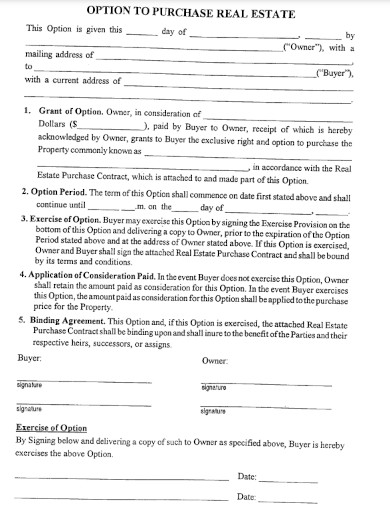
Option to Purchase Real Estate Agreement Template
download now -
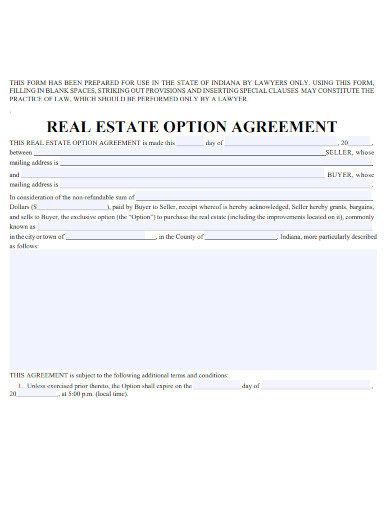
Sample Real Estate Option Agreement
download now -
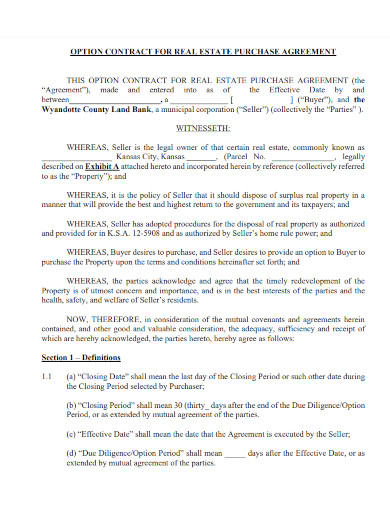
Option Contract for Real Estate Purchase Agreement
download now -
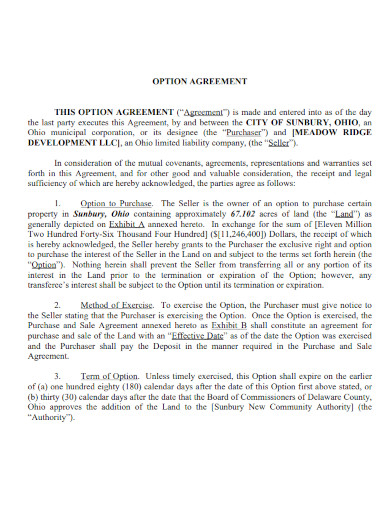
Basic Real Estate Option Agreement Template
download now -

Basic Real Estate Option Agreement Template
download now -
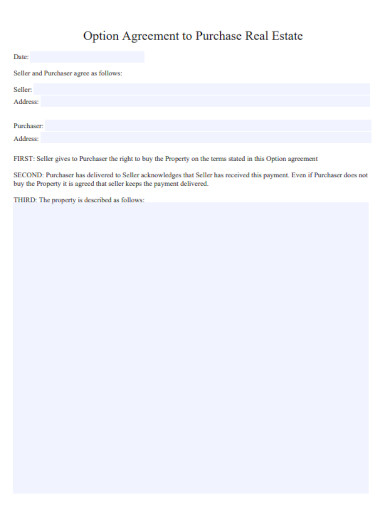
Fillable Option Agreement to Purchase Real Estate
download now -
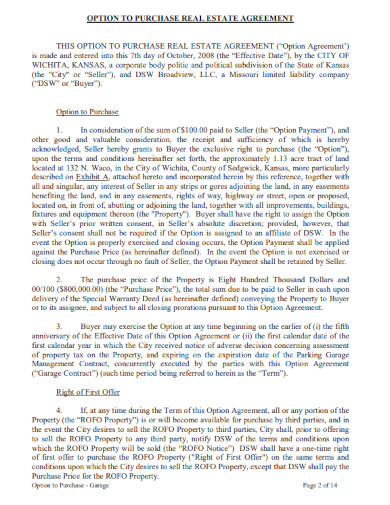
Sample Printable Real Estate Option Agreement Template
download now
FREE Real Estate Option Agreement s to Download
8+SAMPLE Real Estate Option Agreement
What is an Option Agreement in Real Estate?
Key Components of a Real Estate Option Agreement
How to Create a Real Estate Option Agreement?
Legal Essentials of Real Estate Option Agreements
How Does a Real Estate Option Agreement Work?
Are Real Estate Option Agreements Only for Buyers?
What is an Option Agreement in Real Estate?
Unlocking the Power of Real Estate Option Agreements
In the dynamic realm of real estate, savvy investors employ various strategies to secure favorable deals and maximize returns. One such powerful tool is the “Option Agreement.” But what exactly is it, and how can it benefit you?
Understanding the Basics:
An option agreement in real estate is a contractual arrangement between a agreement of property owner (the grantor) and a potential buyer (the optionee). This sample agreement grants the optionee the exclusive right, but not the obligation, to purchase the property at a predetermined price within a specified timeframe. In essence, it provides the optionee with the flexibility to decide whether to proceed with the purchase or let the option expire.
Key Components of an Option Agreement:
Option Fee: The optionee typically pays a non-refundable fee to the grantor for the privilege of holding the option.
Exercise Period: The agreement specifies the timeframe during which the optionee can exercise their right to buy the property sale agreement.
Purchase Price: The predetermined price at which the property can be bought, often locked in at the time of entering the purchase agreement.
Terms and Conditions: Various terms, such as property inspection rights and any specific conditions, are outlined in the agreement.
Benefits of Real Estate Option Agreements:
Flexibility: Option agreements offer flexibility to potential buyers, allowing them to secure a property without the immediate financial commitment of a full purchase.
Market Exploration: Optionees can use the agreed-upon period to assess the property, conduct due diligence, and evaluate market conditions before committing to the purchase.
Risk Mitigation: For sellers, option agreements provide a guaranteed sale within the specified timeframe, offering a level of security in uncertain market conditions.
Negotiation: The parties negotiate and agree on the terms of the option agreement, including the option fee, purchase price, and exercise period.
Execution: Once terms are finalized, the agreement is put in writing and signed by both parties.
Option Period: During the option period, the optionee has the exclusive right to purchase the property.
Decision Time: At the end of the option period, the optionee must decide whether to exercise the option and proceed with the purchase or let the option expire.
Key Components of a Real Estate Option Agreement
A Real Estate Option Agreement is a legally binding contract that grants one party the exclusive right to purchase a property proposal from another party within a specified period, under certain terms and conditions. Here are the key components typically found in a real estate option agreement:
1. Identification of Parties:
Clearly state the names and addresses of both the optionor (property owner) and the optionee (potential buyer).
2. Option Fee:
Define the non-refundable fee paid by the optionee to the optionor for the exclusive right to purchase the property. This fee is usually negotiated between the parties.
3. Property Description:
Provide a detailed and accurate description of the property subject to the option agreement, including its address and any relevant identifiers.
4. Option Period:
Specify the duration of the option, outlining the period during which the optionee has the exclusive right to exercise the option.
5. Purchase Price:
Clearly state the agreed-upon purchase price for the property. In some cases, this price may be fixed at the time of entering into the agreement, while in others, it may be determined at the time of exercising the option.
6. Terms and Conditions:
Outline any specific terms and conditions that both parties must adhere to during the option period. This may include restrictions on the use of the property, inspection rights, or other relevant considerations.
7. Option Exercise Mechanism:
Define the process and requirements for the optionee to exercise their right to purchase the property. This typically includes providing written notice within the specified timeframe.
8. Forfeiture of Option Fee:
Clearly state the circumstances under which the option fee may be forfeited, such as if the optionee fails to exercise the option within the agreed-upon timeframe.
9. Negotiation of Extension:
If applicable, include provisions for negotiating an extension of the option period, specifying any additional fees or conditions associated with such extensions.
10. Closing Procedures:
Outline the steps and procedures that will be followed when closing the sale if the option is exercised. This may include the timeline for completing the transaction and any specific requirements.
11. Governing Law:
Specify the jurisdiction and governing law that will apply to the option agreement, ensuring clarity in the event of any legal disputes.
12. Default and Remedies:
Clearly outline the consequences of default by either party and the available remedies, such as termination of the agreement or legal action.
13. Signatures and Date:
Ensure that the sample document is signed by both parties, acknowledging their agreement to the terms. Include the date of execution.
Creating a Real Estate Option Agreement involves careful consideration of the terms and conditions that both parties agree upon. Here is a step-by-step guide to help you create a Real Estate Option Agreement:
1. Identify the Parties:
Clearly state the full names, addresses, and contact information of both the optionor (property owner) and the optionee (potential buyer).
2. Property Description:
Provide a detailed and accurate description of the property subject to the option agreement, including its address, legal description, and any relevant details that uniquely identify the property.
3. Define the Option Fee:
Clearly specify the non-refundable option fee that the optionee will pay to the optionor for the exclusive right to purchase the property. This fee is often negotiated between the parties.
4. Establish the Option Period:
Clearly define the duration of the option, specifying the period during which the optionee has the exclusive right to exercise the option. Include the start and end dates.
5. Set the Purchase Price:
Clearly state the agreed-upon purchase price for the property. Specify whether this price is fixed at the time of entering into the agreement or will be determined at the time of exercising the option.
6. Outline Terms and Conditions:
Include any specific terms and conditions that both parties must adhere to during the option period. This may include restrictions on property use, inspection rights, or other relevant considerations.
7. Specify Option Exercise Mechanism:
Define the process and requirements for the optionee to exercise their right to purchase the property. This typically involves providing written notice within the specified timeframe.
8. Address Forfeiture of Option Fee:
Clearly state the circumstances under which the option fee may be forfeited. For example, if the optionee fails to exercise the option within the agreed-upon timeframe.
9. Include Negotiation of Extension:
If applicable, include provisions for negotiating an extension of the option period. Specify any additional fees or conditions associated with such extensions.
10. Detail Closing Procedures:
Outline the steps and procedures that will be followed when closing the sale if the option is exercised. Include the timeline for completing the transaction and any specific requirements.
11. Specify Governing Law:
Specify the jurisdiction and governing law that will apply to the option agreement. This ensures clarity in the event of any legal disputes.
12. Address Default and Remedies:
Clearly outline the consequences of default by either party and the available remedies, such as termination of the agreement or legal action.
13. Add Signatures and Date:
Ensure that the document is signed by both parties, acknowledging their agreement to the terms. Include the date of execution.
14. Seek Legal Review:
It’s highly recommended to consult with legal professionals to ensure that the Real Estate Option Agreement complies with local laws and effectively protects the interests of both parties.
Legal Essentials of Real Estate Option Agreements
Creating a legally sound Real Estate Option Agreement requires attention to several essential legal elements to protect the interests of both parties. Here are the legal essentials of a Real Estate Option Agreement:
1. Offer and Acceptance:
The agreement should clearly demonstrate that there was a valid offer from the optionor and an acceptance of that offer by the optionee. This is a fundamental aspect of contract and Agreement formation.
2. Consideration:
A valid contract requires consideration, which refers to something of value exchanged between the parties. In the context of a Real Estate Option Agreement, the option fee paid by the optionee typically serves as consideration.
3. Definite and Certain Terms:
The agreement must have definite and certain terms, including the identification of the property, the option fee, the option period, and the purchase price. Ambiguity in the terms can lead to legal disputes.
4. Capacity of Parties:
Both parties entering into the agreement must have the legal capacity to do so. This includes being of legal age, mentally competent, and not under the influence of coercion or fraud.
5. Legality of Purpose:
The purpose of the agreement must be legal. The option cannot be exercised for an illegal purpose or involve an illegal act.
6. Proper Form:
The agreement should comply with any formal requirements imposed by state or local laws. This may include specific language or formatting.
7. Offer Exclusivity:
The option agreement should clearly state that the optionor grants the optionee the exclusive right to purchase the property within the specified period. This exclusivity is a crucial aspect of option agreements.
8. Clear Option Exercise Mechanism:
The agreement must outline a clear and unambiguous process for the optionee to exercise their right to purchase the property. This includes the method of providing notice and any associated requirements.
9. Forfeiture Conditions:
Clearly define the conditions under which the option fee may be forfeited. This could include the failure of the optionee to exercise the option within the agreed-upon timeframe.
10. Governing Law and Jurisdiction:
Specify the governing law and jurisdiction that will apply to the agreement. This helps in resolving any potential legal disputes and ensures consistency with local laws.
11. Default and Remedies:
Clearly outline the consequences of default by either party and the available remedies. This could include termination of the agreement, damages, or specific performance.
12. Notarization (if required):
Check whether the state or local jurisdiction requires the option agreement to be notarized. If so, ensure that this step is completed.
13. Legal Review:
It is highly advisable to have the Real Estate Option Agreement reviewed by legal professionals to ensure compliance with all relevant laws and regulations.
How Does a Real Estate Option Agreement Work?
The optionee pays an option fee to the optionor for the exclusive right to buy the property. During the option period, the optionee can choose to exercise the option and proceed with the purchase or let the option expire.
You May Also See SAMPLE Option To Lease Agreement In PDF
Are Real Estate Option Agreements Only for Buyers?
A properly executed option agreement is legally binding. It outlines the rights and obligations of both parties and can be enforced through legal means if either party fails to fulfill their obligations.
In conclusion, mastering the intricacies of Real Estate Option Agreements empowers investors and sellers alike. This comprehensive guide has illuminated the key components and offered valuable tips for crafting these agreements strategically. Armed with this knowledge, you can navigate the real estate landscape with confidence, making informed decisions that maximize your returns and minimize risks. Elevate your real estate endeavors by incorporating these essential tips into your option agreement practices.
